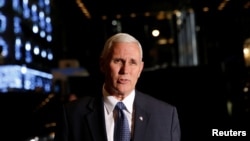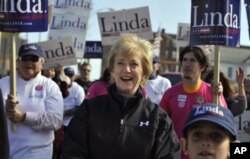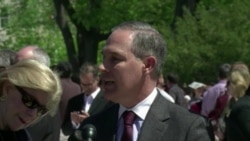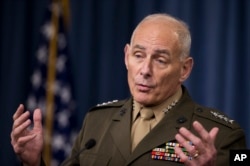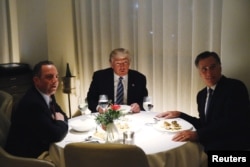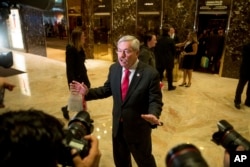U.S. President-elect Donald Trump continued to fill out his cabinet Wednesday, announcing appointments to head the Small Business Administration and Environmental Protection Agency.
Former professional wrestling executive Linda McMahon to head the Small Business Administration.
McMahon, a failed contender for the U.S. Senate and an early supporter of Trump's presidential campaign, is expected to play a key role in Trump's efforts to generate more U.S. jobs.
McMahon is a co-founder and CEO of World Wrestling Entertainment Inc., a prominent sports entertainment company. She said in a statement Wednesday that she plans to "promote our country's small businesses and help them grow and thrive."
Lawyer Scott Pruitt, an ally of the fossil fuels industry, has been chosen to head the Environmental Protection Agency.
Also Wednesday, a transition official told the New York Times that Trump plans to name Oklahoma Attorney General Scott Pruitt to lead the Environmental Protection Agency.
Pruitt has been a vocal critic of what he called the EPA's " activist agenda" and has said he does not believe climate changed is caused by man-made carbon emissions, saying the debate over climate change is "far from settled."
As Oklahoma's top law enforcement officer, Pruitt is currently involved in a lawsuit with 23 other states against the EPA over environmental regulations. He has also filed briefs in support of the Keystone XL Pipeline project, a proposed oil pipeline opposed by the Obama administration.
Earlier Wednesday, transition officials said Trump has chosen retired Marine General John Kelly to lead the Department of Homeland Security, a massive and troubled agency tasked with combating terrorism and executing Trump's promise to crack down on illegal immigration.
Officials said Kelly was nominated because of his expertise regarding the southwest border the United States shares with Mexico and his stated desire to address illegal drugs, terrorism and other threats he believes originate in Central and South America.
In 2010, Kelly's son, Lt. Robert Kelly, was killed in a land-mine explosion in Afghanistan, making the general the highest-ranking U.S. military officer to lose a child in the wars in Afghanistan or Iraq.
Kelly, who is expected to win Senate confirmation, is the latest in a string of former military figures to be nominated for positions in the incoming Trump administration. Trump has also nominated retired Lt. General Michael Flynn as national security advisor and retired Marine General James Mattis as defense secretary. Retired Army General and former Central Intelligence Agency chief David Petraeus is said to be among those under consideration for secretary of state.
Trump said earlier Wednesday that former critic and 2012 Republican presidential candidate Mitt Romney is still being considered for secretary of state, reinforcing reports that Romney remains the leading contender for the position.
“I’ve spoken to him a lot. I think we’ve come a long way,” Trump said of Romney in a telephone interview on NBC’s Today show.
Trump said he will likely announce his choice for the nation's top diplomatic post next week.
Trump appeared last week to have narrowed his list to four names: Romney, Petraeus, former New York City Mayor Rudy Giuliani and Tennessee Senator Bob Corker.
Trump has also interviewed former U.N. Ambassador John Bolton and is talking to several other people as well, including retired Navy Admiral James Stavridis and former U.S. Ambassador to China Jon Huntsman.
Earlier Wednesday, Trump selected Iowa Governor Terry Branstad as the next U.S. ambassador to China, a country Trump rattled recently with tough trade talk and a telephone call with Tsai Ing-wen, the president of Taiwan, a rival of China.
Branstad has a relationship with Chinese President Xi Jinping that goes back more than 30 years.
The president-elect met Tuesday with the CEO of ExxonMobil Corporation, Rex Tillerson, who has also been mentioned as a candidate for secretary of state. The 64-year-old Texas oilman has no government experience, but has close ties with Russian President Vladimir Putin and other world leaders.
Trump returned Tuesday to his vision of a non-interventionist foreign policy for the United States, saying as he did during his campaign, that he does not want to have American forces fighting "in areas that we shouldn't be fighting in."




